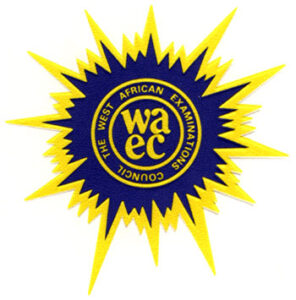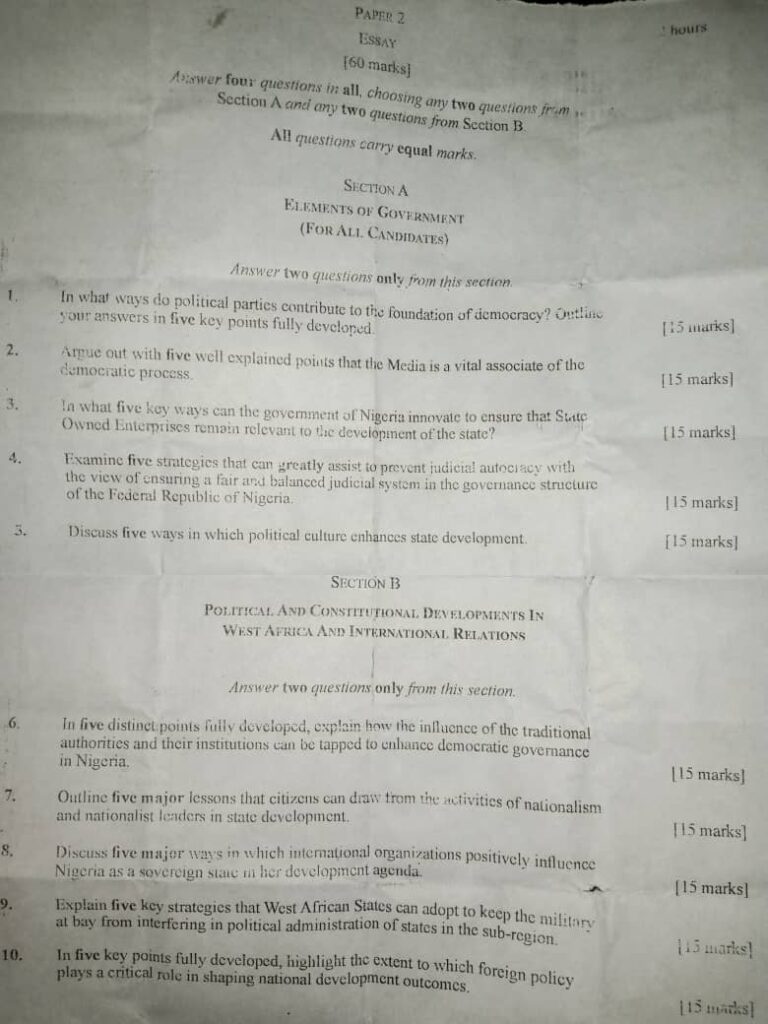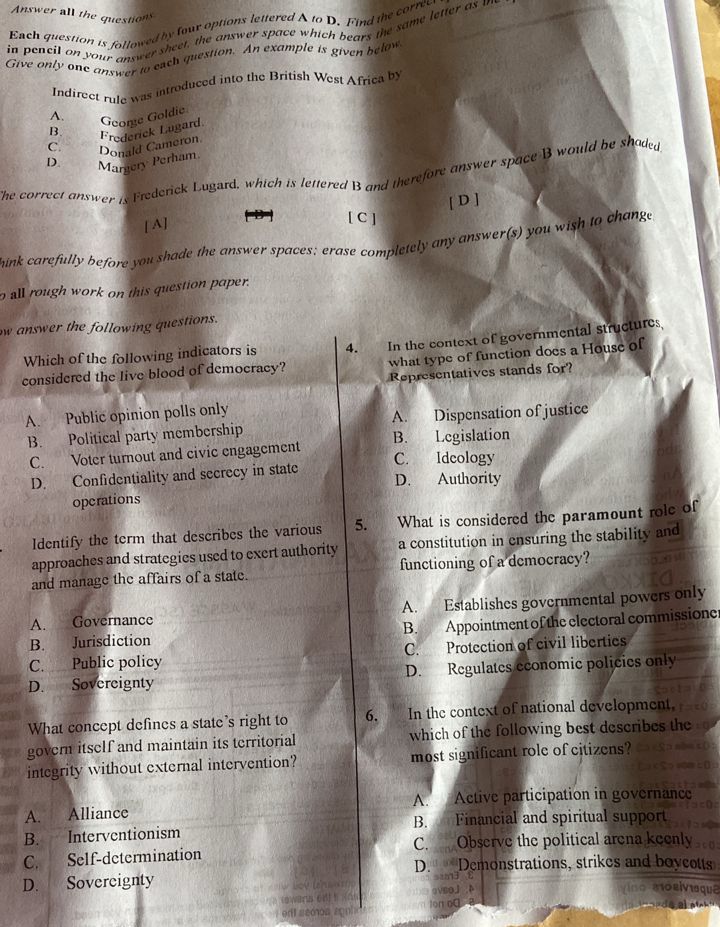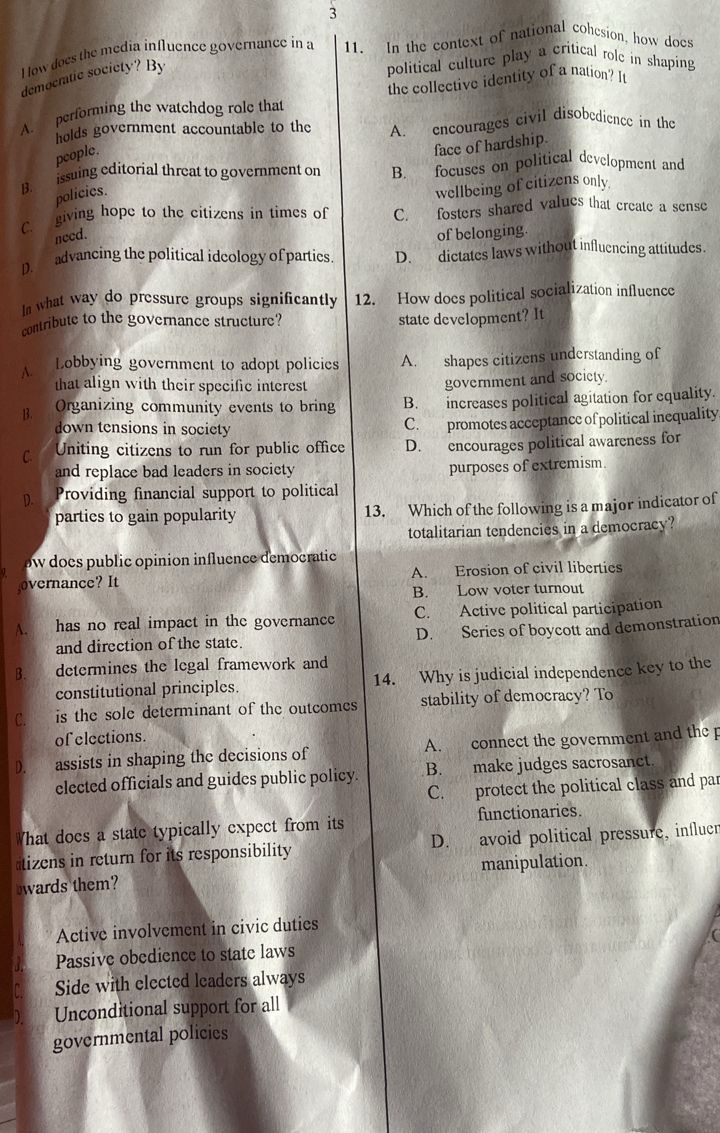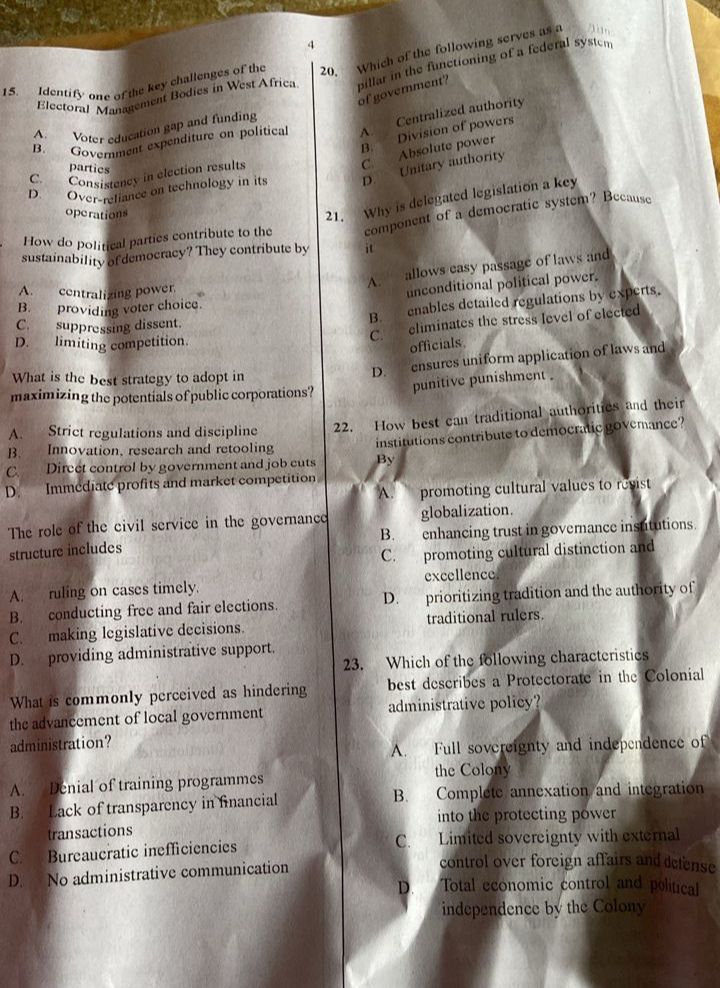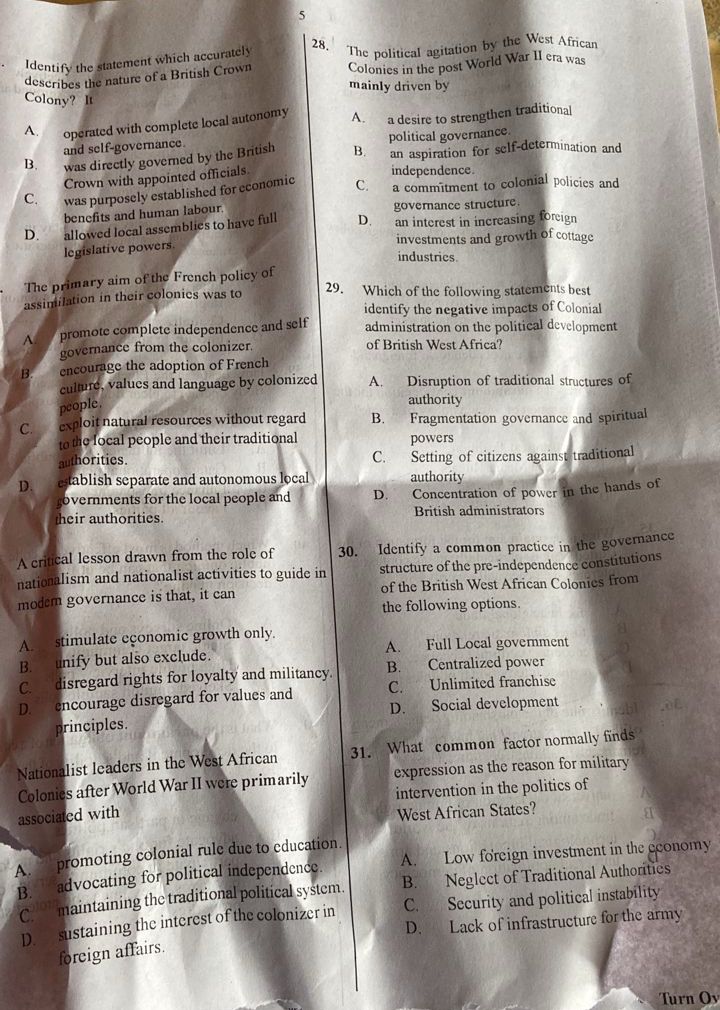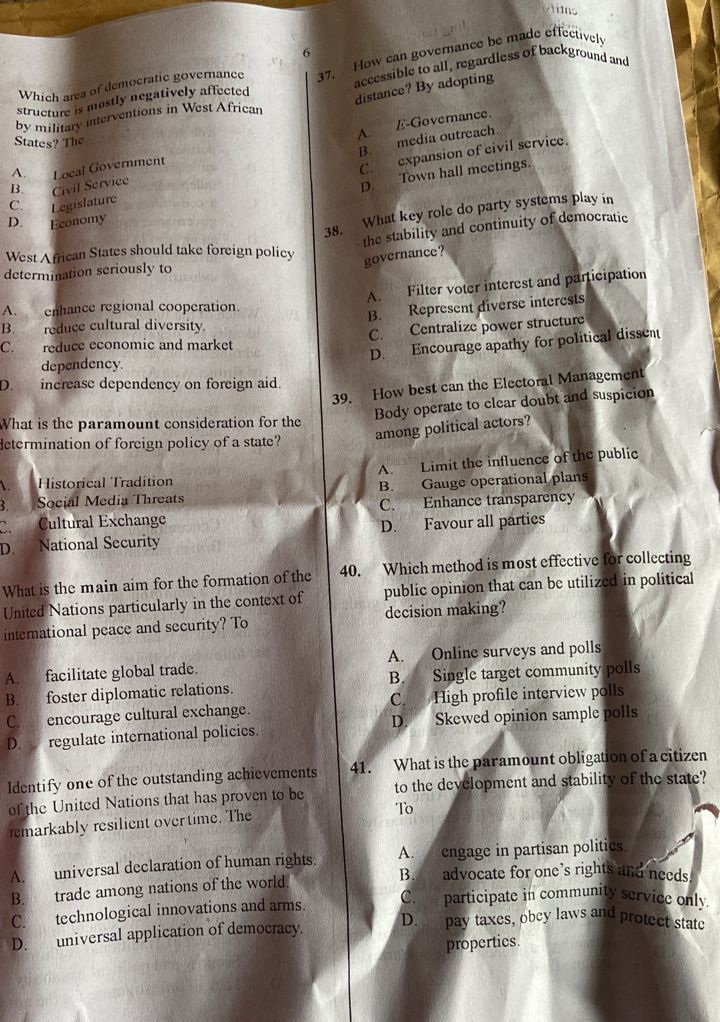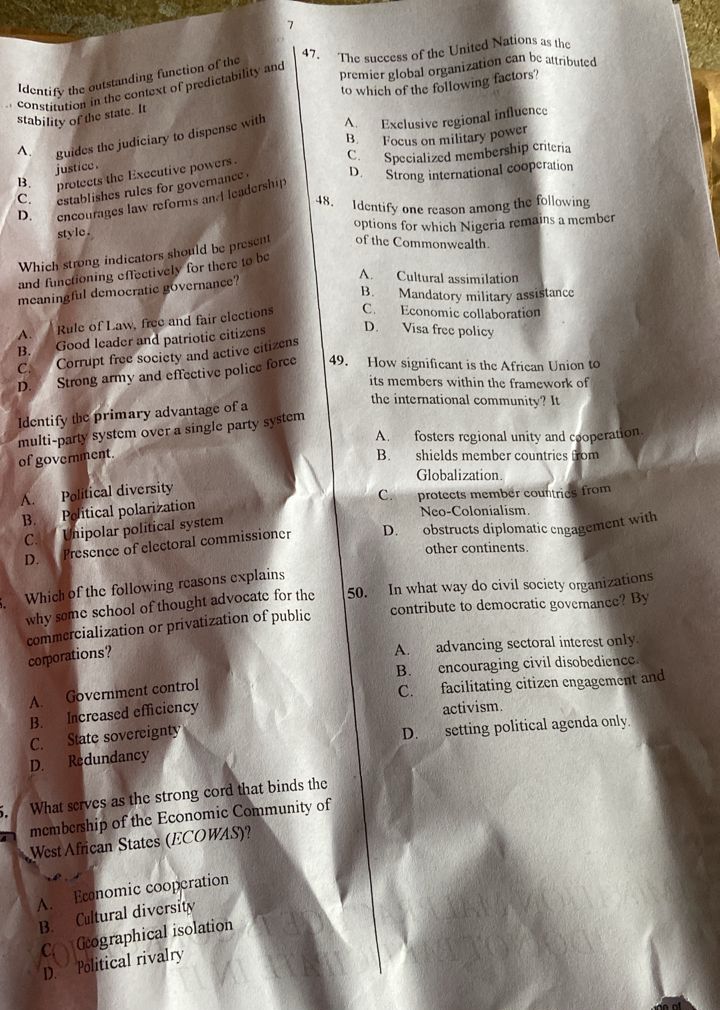WAEC 2025 Government Questions and Answers – Expo/Runz - Education - Earboard |
|---|
(0) (Reply) (Create New Posts) (Go Down)
| WAEC 2025 Government Questions and Answers – Expo/Runz by Blogger: 10:30 am On May 13, 2025 |
WAEC 2025 Government theory and objective questions and answers are now out! To get them, buy an MTN Recharge card of N1000 and send the PIN with the subject paid for to 09067385575. If you have already paid, click the LINK below to enter your password and view the answers now. Don’t have the money to pay? Share this post with all your friends writing WAEC, and you might get it for free.
Take Our Paid Runz: With N1000, we will send you the password to view all the answers 3 hours before the exam starts. To make payment, buy an MTN Recharge card of N1000 and send the PIN to 09067385575. You can also transfer to the number or contact us for our bank details. Benefits of Paid Runz
How to send the card: Type the card pin, your subjects & phone number and send to 09067385575. You can also call or message the above number for more details. Why are we the best? We give you 24/7 customer support. We give you another subject for free if you didn’t get the answers to the one you paid for. We offer the cheapest Runz (N1000 per Subject, N5000 for 8-9 Subjects and N10000 for all our runz). Our answers are genuine. We also give free Runz to candidates who cannot afford our paid Runz. Where else on the internet can you get this kind of service? Subscribe now and enjoy while it lasts! FREE ANSWERS Tuesday, 13th May 2025 GOVERNMENT OBJ: (WITH NUMBERING) GOVERNMENT ESSAY: (ii) Recruitment of Political Leaders: Parties identify, groom, and present candidates for public office. This recruitment process ensures that individuals with leadership qualities and commitment to public service are selected to govern, which strengthens the democratic system. (iii) Provision of Policy Alternatives: Political parties formulate and present different policy programmes to the public. This provides voters with clear choices during elections and promotes competition in ideas and governance strategies, which is a core principle of democracy. (iv) Organization of Government: In most democratic systems, the party (or coalition) that wins the majority of seats in the legislature forms the government. This structure helps ensure an orderly and legitimate transition of power, based on the will of the people. (v) Representation of Interests: Parties aggregate and represent the diverse interests of various groups in society, such as workers, farmers, business people, and ethnic or religious communities. This ensures inclusive governance and reduces the likelihood of marginalization. (vi) Promotion of National Unity: By operating across different regions and drawing support from various segments of society, political parties help to promote unity in a multi-ethnic or multi-religious country. National parties in particular play a unifying role in diverse societies like Nigeria. (vii) Peaceful Change of Government: Political parties make peaceful transitions of power possible through elections. Instead of resorting to violence or military coups, they provide a structured and accepted mechanism for changing leadership, thus upholding democratic values. (2) (ii) Exposing Corruption and Wrongdoing: (iii) Promoting Public Awareness: (iv) Giving Voice to the People: (v) Monitoring Elections: (vi) Bridging the Gap Between Government and Citizens: (vii) Supporting Policy Change: (viii) Promoting Transparency in Governance: (3) (ii) Strengthening Corporate Governance and Accountability: One major innovation is implementing strict corporate governance frameworks to guide the operations of SOEs. The government should ensure that qualified professionals manage these enterprises, and that their performance is regularly reviewed. This will reduce political interference, promote transparency, and enable SOEs to operate with business-minded strategies that contribute to national development. (iii) Promoting Public-Private Partnerships (PPPs): (iv) Regular Training and Capacity Building for Staff: To ensure relevance and efficiency, the government must invest in regular training and capacity development for SOE employees. This will keep them updated on modern business practices, industry trends, and technological advancements. A well-trained workforce will drive productivity and innovation, which are essential for the growth and sustainability of these enterprises. (v) Diversifying Revenue Sources and Business Models: The government should encourage SOEs to explore new revenue streams and adopt flexible business models that respond to market demands. For instance, a government-owned transport company can integrate logistics or delivery services into its operations. This approach will reduce overdependence on government funding and ensure financial sustainability. (vi) Implementing Performance-Based Incentives and Sanctions: Introducing a system of rewards for excellent performance and penalties for poor results can drive efficiency in SOEs. Employees and managers will be motivated to meet set goals if promotions, bonuses, or renewals of contracts are based on measurable results. This will create a culture of accountability and continuous improvement in operations. (vii) Leveraging Research and Development for Innovation: The government can encourage SOEs to invest in research and development to create new products, improve services, and optimize operations. Partnering with universities and research institutions can also bring about innovations that address local challenges. This will ensure that SOEs contribute meaningfully to economic diversification and national development. (4) (ii) Ensuring Transparent Judicial Appointments: One major cause of judicial autocracy is the appointment of judges based on favoritism or political loyalty. To prevent this, the process of appointing judges in Nigeria must be transparent, competitive, and based on merit. The National Judicial Council (NJC) should maintain independence and resist political pressure when selecting or promoting judges. (iii) Establishing a Strong and Independent Judicial Council: The National Judicial Council (NJC) should be empowered to discipline erring judges and oversee the conduct of judicial officers. A strong and independent National Judicial Council helps to reduce corruption and ensure that judges remain impartial and professional. Regular performance evaluations and disciplinary procedures should be enforced. (iv) Enforcing Judicial Ethics and Accountability: Judicial officers must adhere to a strict code of ethics. Mechanisms should be in place to receive complaints from the public and punish unethical behavior. Open disciplinary hearings and published outcomes can deter misconduct and remind judges of their responsibility to uphold the rule of law. (v) Civic Education and Public Awareness: When citizens are aware of their legal rights and the limits of judicial power, it becomes harder for the judiciary to overstep its bounds. Educating the public about the Constitution, court procedures, and the role of the judiciary in democracy will strengthen demand for fairness and reduce public tolerance for judicial overreach. (vi) Judicial Term Limits and Retirement Policies: To avoid the concentration of power, there should be clear and enforced term limits and retirement ages for judicial officers. This helps to ensure a regular infusion of fresh minds into the judiciary and prevents some individuals from holding office for too long, which can lead to autocratic behavior. (vii) Media Freedom and Judicial Transparency: A free press can serve as a watchdog over the judiciary. When court proceedings and judgments are openly reported and analyzed, it discourages bias and secrecy. Public access to court records and live broadcasts of major trials also improves transparency and limits hidden abuses. (viii) Decentralization and Reform of the Judicial Structure: To avoid the concentration of power in the higher courts, Nigeria should empower lower courts through training, resources, and independence. This will reduce case overload in higher courts and distribute decision-making authority more evenly across the system. (5) (ii) Promotes Political Stability: A culture that emphasizes respect for democratic processes, such as free and fair elections, helps to maintain political stability. Stability creates a conducive environment for effective governance and the implementation of long-term policies that foster economic and social development. (iii) Strengthens Democratic Institutions: In a society where there is a culture of valuing transparency, accountability, and the rule of law, there is greater pressure on political leaders to perform effectively. Strong institutions, such as the judiciary, legislature, and electoral bodies, are crucial for fostering good governance and ensuring state development. (iv) Enhances National Unity and Integration: Political culture that emphasizes inclusivity, respect for diversity, and patriotism helps foster national unity. This unity is essential for sustainable development, as it reduces ethnic and religious tensions and encourages collaboration among all groups in the society for the collective good. (v) Encourages Civic Responsibility: When citizens are taught the importance of civic duties, such as paying taxes, obeying the law, and participating in community development, it leads to more effective governance. A politically responsible population contributes to the maintenance of order and the proper use of state resources, which is crucial for development. (vi) Promotes Good Governance and Accountability: A political culture that values transparency and accountability encourages the public to hold leaders responsible for their actions. This reduces corruption and ensures that state resources are used effectively for the benefit of the people, which supports development goals. (vii) Facilitates Social and Economic Policy Support: A positive political culture fosters trust in government policies and encourages citizens to support initiatives that promote economic growth and social welfare. When people have confidence in the state’s leadership, they are more likely to support policies related to education, healthcare, infrastructure, and poverty reduction, which ultimately contribute to the state’s development. (6) (ii) Conflict Resolution and Peacebuilding: Traditional institutions have long been known for settling disputes through customary processes. They can help reduce election-related violence by calming tensions and promoting peaceful coexistence. Their involvement strengthens democracy by ensuring that conflicts are resolved peacefully and locally. (iii) Moral and Cultural Guidance: Traditional authorities uphold moral values and community ethics, which are essential for good governance. When traditional rulers speak against corruption, electoral malpractice, and violence, they influence their communities to uphold integrity. This promotes ethical political behavior and strengthens democratic norms. (iv) Bridging the Gap Between Government and the People: Traditional rulers serve as a link between the people and government officials. They can interpret government policies in local languages and ensure that public concerns are conveyed to authorities. This helps make governance more inclusive and responsive to local needs. (v) Mobilizing Community Development Initiatives: Traditional authorities can organize and mobilize people for community projects. With government support, they can help implement developmental programs such as building schools, health centers, and roads. This promotes a participatory approach to governance, a key feature of democracy. (vi) Enhancing Voter Education and Election Monitoring: Traditional leaders can use their respective positions to educate their people about the importance of voting and the dangers of electoral violence and vote buying. Their presence on election days can discourage misconduct and encourage transparency in the process. (vii) Preserving Identity and Promoting National Unity: Traditional institutions reflect Nigeria’s diverse cultures and histories. By recognizing and involving them in governance, the country promotes cultural inclusion and unity. This helps reduce tension among ethnic groups and supports the democratic goal of national integration (7) (ii) Advocacy for Social Justice: Nationalist leaders often advocated for social justice, including equality and fair treatment for all citizens. Through their struggles against colonialism and oppression, they taught citizens the value of fighting for the rights of marginalized groups. This can inspire modern citizens to continue the fight for social justice, equitable opportunities, and the protection of human rights in state development. (iii) Civic Engagement and Participation: Nationalist movements emphasized the importance of active participation in governance and public affairs. Leaders encouraged citizens to be informed, engage in politics, and contribute to the shaping of their nation. This can inspire contemporary citizens to remain involved in democratic processes, such as voting, policymaking, and national development initiatives. (iv) Promotion of National Sovereignty: One of the key lessons from nationalist leaders is the importance of national sovereignty and self-determination. They fought for the right of their people to govern themselves, free from external control or influence. This lesson encourages citizens to value and protect their nation’s sovereignty, ensuring that political decisions and state development are made with the best interests of the nation in mind. (v) Resilience and Persistence: Nationalist leaders exhibited resilience in the face of adversity, often enduring long periods of struggle and sacrifice. Citizens can learn from their determination to overcome obstacles, even when the path to independence or justice seemed impossible. This persistence can be applied to modern efforts in tackling national challenges and striving for long-term development. (vi) Economic Self-Reliance: Many nationalist movements emphasized the need for economic independence and the development of local industries. Nationalist leaders promoted the idea that a nation should not depend solely on foreign powers but should strive for self-sufficiency in its economic activities. This lesson teaches citizens the importance of fostering local industries, entrepreneurship, and innovation to support state development. (vii) Cultural Identity and Heritage: Nationalism often involved a renewed focus on cultural pride and the preservation of national heritage. Leaders encouraged citizens to embrace their traditions, languages, and cultural practices as a means of strengthening national identity. (8) (ii) Promotion of Good Governance: International organizations such as the United Nations (UN) and the African Union (AU) assist in promoting good governance in Nigeria by providing guidance on policies that encourage democracy, transparency, and accountability. They also assist in the creation of legal frameworks and institutions that ensure the rule of law and effective governance. These efforts help to improve Nigeria’s political environment, fostering stability and growth. (iii) Humanitarian Aid and Disaster Relief: In times of natural disasters, famine, or conflict, international organizations like the Red Cross and the United Nations provide immediate humanitarian aid to Nigeria. They offer emergency relief in the form of food, medical supplies, and shelter to affected populations. This aid is crucial in minimizing the impact of disasters on vulnerable communities and ensures the survival and well-being of citizens. (iv) Promotion of Trade and Economic Growth: International organizations such as the World Trade Organization (WTO) and the African Development Bank (AfDB) help Nigeria in fostering trade and economic growth through the establishment of trade agreements, regulations, and access to regional and global markets. These organizations work with Nigeria to improve its trade relations, which in turn boosts its economy and creates employment opportunities. (v) Capacity Building and Technical Support: International organizations play a significant role in building Nigeria’s capacity in various sectors by providing technical support, training programs, capacity building ensures that Nigeria’s workforce and institutions are better equipped to handle national challenges and contribute to sustainable developmentand expertise. For instance, the United Nations Development Programme (UNDP) offers expertise in areas such as environmental sustainability and poverty reduction. This capacity building ensures that Nigeria’s workforce and institutions are better equipped to handle national challenges and contribute to sustainable development. (vi) Support for Health and Education Sectors: International organizations like the World Health Organization (WHO) and the United Nations International Children’s Emergency Fund (UNICEF) support Nigeria’s health and education systems through funding, policy guidance, and provision of essential supplies. For example, they assist in vaccination campaigns, disease prevention, and maternal health programs. Their involvement improves healthcare delivery and educational access, especially in rural and underserved communities. (vii) Promotion of Peace and Security: Organizations such as the Economic Community of West African States (ECOWAS) and the United Nations help in maintaining peace and security within Nigeria and the West African sub-region They intervene in conflict situations, support peacekeeping missions, and provide training for security personnel. This ensures political stability and national security, which are essential for development and foreign investment. (9) (ii) Promoting Good Governance and Accountability: Governments in the sub-region should embrace transparency, accountability, and the rule of law in their administration. When political leaders are responsive to citizens’ needs and reduce corruption, there is less public support for military intervention. Good governance helps to reduce grievances that the military may exploit to justify a coup. (iii) Professionalizing the Military: The military should be trained to understand and respect their constitutional role as protectors of the nation, not political rulers. Regular training and orientation programs should emphasize loyalty to the constitution and civilian authority. A professional military is less likely to meddle in politics. (iv) Ensuring Civilian Oversight of the Military: Civilian authorities must maintain firm control over military operations and decision-making through parliamentary committees or defense ministries. Such oversight prevents the military from acting independently or forming political alliances. This measure ensures the military remains subordinate to democratically elected leaders. (v) Providing Adequate Welfare and Resources for the Military: Neglecting the welfare of military personnel can lead to dissatisfaction and rebellion. Governments should ensure timely payment of salaries, provision of proper housing, equipment, and pensions for service members. A well-catered-for military is more focused on its duties and less likely to seek political power. (vi) Enacting and Enforcing Anti-coup Laws: Clear constitutional provisions should be in place to criminalize coups and unconstitutional changes of government. West African countries must also prosecute those who carry out or support military takeovers to discourage future occurrences. Laws against coups serve as deterrents and reinforce democratic norms. (vii) Regional and International Cooperation: West African states should collaborate with regional bodies like ECOWAS and international partners to prevent and respond to military takeovers. ECOWAS, for instance, can impose sanctions, travel bans, and other measures against coup plotters. Joint action demonstrates that unconstitutional seizures of power will not be tolerated in the region. (10) (ii) Access to International Aid and Grants: Through strategic foreign relations, a country can secure financial assistance, humanitarian aid, and development grants from international partners, donor countries, and global institutions like the World Bank and IMF. These funds support infrastructure, education, health, and other key sectors. (iii) Expansion of Trade and Market Opportunities: Foreign policy determines the terms of trade agreements with other countries. Favorable trade relations allow a country to export goods, access foreign markets, and earn foreign exchange, which is essential for national economic development. (iv) Technological and Educational Exchange: Strong diplomatic ties can facilitate access to modern technology, educational partnerships, scholarships, and training programs for citizens. This improves human capital development and drives innovation, research, and productivity. (v) National Security and Peacekeeping Support: Foreign policy helps to build alliances and security partnerships that enhance a country’s internal and external security. This includes military cooperation, intelligence sharing, and peacekeeping missions, all of which promote a stable environment necessary for development. (vi) Tourism Promotion and Cultural Exchange: Countries with friendly foreign policies and good international relations are more likely to attract tourists and host international cultural events. Tourism generates revenue, creates employment, and enhances the country’s global image. (vii) Influence in Global Decision-Making: An active and strategic foreign policy allows a country to participate in international organizations (e.g., UN, AU, ECOWAS), where it can influence global decisions that affect its development, such as trade regulations, climate policies, and peace efforts. (viii) Crisis Management and Disaster Support: Foreign policy enables a country to quickly receive international support during emergencies such as pandemics, natural disasters, or conflicts. Humanitarian assistance and technical support in such times help prevent setbacks in national development.
COMPLETED – GOODLUCK
OBJECTIVE QUESTIONS
TAGS: WAEC Government Essay & Objective exam, 2025 questions on (Objective & essay) exam, 2025 Government Essay & Objective exam waec question, waec Government Essay & Objective exam questions and answers pdf, 2025 waec Government Essay & Objective1 & 2 (Objective & Prose) exam questions and answers, waec Government 2025, waec Government Essay & Objective exam topics, waec past questions on Government Essay & Objective exam pdf
|
(0) (Reply)
College of Nursing Sciences, Waterside, Onitsha 2026/2027 [07076026905] [07017689160] / College of Nursing Sciences, Federal Medical Centre, Asaba, Delta State 2026/2027 [09022534226] / College of Nursing Sciences, Waterside, Onitsha 2026/2027 [07076026905] [07017689160] /
(Go Up)
|
Earboard Forum - Copyright @ 2016 - 2026. All rights reserved. See How To Advertise. DMCA Content Removal. Disclaimer: Every member is solely responsible for anything that he/she posts or uploads on Earbaord. |
